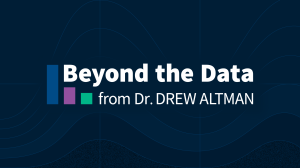It’s Not a Health Care Election, But Health Issues Might Still Add Up
 will often hear that this is not a health care election. And it’s not. It’s an election mostly about former President Trump and President Biden. There is no big national health reform debate to galvanize voters’ attention.
will often hear that this is not a health care election. And it’s not. It’s an election mostly about former President Trump and President Biden. There is no big national health reform debate to galvanize voters’ attention.
On the other hand, it is again expected to be a very tight election and abortion will and should be in the spotlight, and potentially other health issues.
Tight elections are a “game of inches” where a slight change in turnout or shift in a swing voting group in a few states can make the difference. That’s why health care may still matter in this election. A combination of several health issues, which are salient to different swing voting groups, could add up in the right battleground states and have enough of an impact to matter in the election. Here is a general roadmap of the several ways that might happen.
Elections obviously also have enormous implications for health policy. This one is almost a fork-in-the-road election on health care. Biden can be expected to continue to build on public programs such as the Affordable Care Act (ACA), Medicaid and Medicare, and protect reproductive rights. While Trump has a somewhat erratic approach to health policy – at times castigating drug companies and high drug prices, for example – a Trump administration could be expected to move generally in the opposite direction, including on abortion. (See Trump vs Biden on Health Care and What Would Another Trump Presidency Look Like for Health Care?)
Above all else, key battleground states will matter to the presidential election outcome. Those are thought to be Arizona, Nevada, Georgia, Wisconsin, Pennsylvania, and Michigan. As is well known, the margin of victory in most of these states was exceedingly small in 2020. In all six swing states, 312,861 votes made the difference. The margin was 10,457 in Arizona; 20,682 in Wisconsin; and famously, 11,779 in Georgia. Even a little traction for a health issue could play a role with margins like these. The same is true for other issues, such as the Israel-Hamas war in Michigan or immigration in some states.
A number of health issues could also matter in these states, and in every state in congressional races. First on the list is abortion and reproductive rights, which could boost turnout in what, at this point, appears to be an unenthusiastic Democratic base, or potentially sway enough swing voting groups to the democratic side to make a difference in some battlegrounds. Nothing focuses voters on an issue like a state ballot initiative, and a state constitutional amendment is possible in Arizona, and may have an outside chance in Nevada.
Based on KFF’s recent polling, about a quarter of voters overall say they will only vote for a candidate who shares their views on abortion with democrats having the advantage with voters on the issue. Less than 5 percent of Republican women say they are dedicated abortion rights voters, meaning they are pro-reproductive rights and say they will only vote for a candidate who shares that view. But again, even small numbers can matter if the difference in a swing state is as little as 10,000 votes. More importantly, few voters are single issue voters and what is unclear is how many Republican and independent women combine concerns about Dobbs with other concerns they may have about Trump that might add up to a vote for Biden or keep them home. In the Republican primaries so far, almost 6 in 10 Haley voters say they would not vote for Trump, although it’s too early to say what they will do in November.
A collection of other health issues could also sway some other voters, including threats to the ACA, Medicaid expansion, drug costs, and other affordability issues. One question is whether or not Trump’s renewed threats to the ACA were only a primary tactic to stir up a base that is still largely anti-ACA or if it will have legs. If he continues to talk about repealing the ACA through the general election, he won’t gain any new votes (he already has those voters), but he could elevate the issue and give Democrats a juicier target, potentially rallying some base Democratic voters or swaying some Independents at the margin.
Regardless, our most recent tracking poll showed that worries about health care affordability are at the core of the public’s economic concerns, not separate from them. Voters want candidates to talk more about affordability, including 89% of voters who have problems paying their health care bills. Historically, health issues have generally favored Democrats. To appeal to voter’s concerns about health care affordability, Biden will certainly be talking about efforts to make coverage more affordable under the ACA, rein in drug costs through price negotiation and annual out of pocket caps for Medicare and lower the costs of insulin–policies that are understandable to voters even as they directly benefit relatively narrow constituencies.
Finally, health could matter because health issues are salient to different swing voting groups: Women, Republican women, suburban women, and younger voters for some issues, such as gun violence or opioids. Our most recent tracking poll showed that women were even more concerned about health care affordability and drug costs than men, perhaps not surprisingly since they carry so much responsibility for making family health decisions.
Whether health issues have an impact in the election is not self-executing. It depends a lot on what candidates talk about, what’s hot in a state, and what advocacy and grassroots groups do—or fail to do—to elevate health issues. This is not a “health care election,” but as Donald Rumsfeld might say if he were still around, it’s not, not one either.
